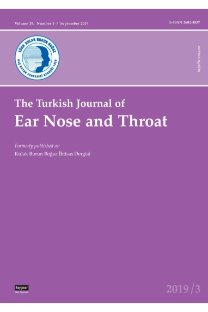İsotretinoin kullanımının kronik rinosinüzit üzerindeki klinik etkilerinin değerlendirilmesi
Amaç: Bu çalışma, bir retinoik asit türevi olan izotretinoinin 13-cis-retinoik asit kronik rinosinüzit kliniği üzerine olan etkilerini araştırmayı amaçlamaktadır.Hastalar ve Yöntemler: Çalışma grubu, akne tedavisi için izotretinoin kullanmakta olan 25 kronik rinosinüzit hastası 16 kadın, 9 erkek; ort. yaş 25.2±6.8 yıl; dağılım 15-25 yıl , kontrol grubu ise izotretinoin kullanmayan 25 kronik rinosinüzit hastasından 15 kadın, 10 erkek; ort. yaş 25.2±6.8 yıl; dağılım 15-25 yıl oluşturuldu. Hastaların semptom, muayene ve radyoloji bulgularının değerlendirilmesi amacıyla görsel analog ölçekteki GAÖ semptom skorları, Lanza ve Kennedy nazal endoskopi skorları ve Newman bilgisayarlı tomografi BT skorları elde edildi. Hastaların semptomları ve muayene bulguları birinci gün, ikinci hafta, 3-5 ve 6-10. aylarda değerlendirildi Paranazal sinüs BT sonuçları ise birinci gün ve 6-10. ayda çalışıldı.Bulgular: İzotretinoin uygulanan gruptaki hastaların ortalama semptom ve muayene skorlarında akut dönemde 2. hafta anlamlı bir değişiklik gözlenmez iken, uzun dönemde 3-5 ay ve 6-10 ay anlamlı gerileme tespit edildi. İsotretinoin tedavisi sonrasında ortalama BT skorlarında anlamlı gerileme saptandı. Kontrol grubunda ise hiçbir skorda anlamlı bir değişiklik görülmedi. İzotretinoin grubunda akut sinüzit atakları kontrol grubuna göre anlamlı olarak daha az idi. Geçirilen akut sinüzit ataklarının iyileşme süreleri açısından iki grup arasında anlamlı bir fark tespit edilmedi.Sonuç: Çalışmamızda izotretinoinin uzun dönem kullanımının rinosinüzite ilişkin klinik sonuçları üzerine olumlu etkileri olduğu sonucuna varıldı
Evaluation of the clinical effects of isotretinoin on chronic rhinosinusitis
Objectives: This study aims to evaluate the clinical effects of isotretinoin 13-cis-retinoic acid , a derivative of retinoic acid, on the clinical features of chronic rhinosinusitis. Patients and Methods: The study group included 25 chronic rhinosinusitis patients 16 females, 9 males; mean age 25.2±6.8 years; range 15 to 25 years who were on isotretinoin for acne treatment, while the control group consisted of 25 chronic rhinosinusitis patients 15 females, 10 males; mean age 25.2±6.8 years; range 15 to 25 years who were not on isotretinoin treatment. The patients’ symptom scores in visual analog scale VAS , Lanza and Kennedy nasal endoscopic scores and Newman computed tomography CT scores were obtained in order to evaluate the their symptom, examination and radiological findings. These patients’ symptom and examination results were evaluated first day, week two and at months 3-5 and 6-10. Paranasal sinus CT results were studied first day and at months 6-10. Results: In the group of patients being administered isotretinoin, no significant change in the mean symptom and examination scores was detected during the acute phase week 2 , while there was a significant regression in the longterm months 3-5 and 6-10 . There was a significant regression in the mean CT score after isotretinoin therapy. In the control group no significant change was seen in any of the scores. The number of acute sinusitis attacks were significantly lower in the isotretinoin group than in the control group. No significant difference was found between the two groups in terms of the duration of the healing period of acute sinusitis attacks. Conclusion: We conclude that the long-term administration of isotretinoin has positive effects on the clinical results of chronic rhinosinusitis.
